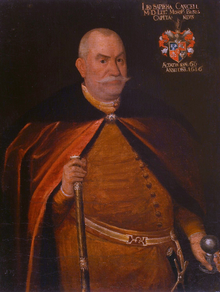Lev Sapieha
Lew Sapieha (* 4. April 1557 in Ostrowno ( Rajon Beschanowitschy ) in today's Vitebsk Region of Belarus ; † 7. July 1633 in Vilnius , Lithuania ) was a statesman in the Polish-Lithuanian Commonwealth of the 16th to the end and beginning of the 17th Century.
Life
Sapieha comes from the noble family Sapieha , a magnate family from the Lithuanian part of the Polish-Lithuanian state at the time of the greatest cultural and economic prosperity in the country. He studied in Leipzig from 1570 to 1573. On his return he entered the service of Stefan Batory , King of Poland and Grand Duke of Lithuania, and worked under Jan Zamoyski . Sapieha turned from the Orthodox faith of his youth and became a Calvinist . In 1580 he became Grand Secretary for the Grand Duchy of Lithuania, and in 1581 he was promoted to capital letters for Lithuania. In 1582 he acted as Sejm Marshal (President of Parliament) for the regular annual session of the Sejm in Warsaw in October and November.
After the death of Ivan the Terrible in 1584, he supported the idea of an alliance with the Grand Duchy of Moscow ( Muscovy ). The following year he became Grand Chancellor of the Grand Duchy of Lithuania and held this position until 1623. From 1585 to 1586 he was the administrator of the finances (Chancellor of the Exchequer) of Lithuania for one year. From 1621 to 1625 he was the voivode of Vilnius and then, until the end of his life, he was the Grand Hetman of Lithuania and Starost of Slonim , Brest and Mogilev counties .
Sapieha laid the foundation for the power and wealth of the Sapieha family that continued for over three hundred years . From his two marriages, Sapieha had eight surviving children. His youngest son Kazimierz Lew also became a politician in Poland-Lithuania. He organized the resistance against the Swedes after the end of the Thirty Years War .
Foreign Policy and Wars of Poland-Lithuania
Sapieha was the head of the diplomatic delegation to Moscow in 1600 that proposed a political union to the Russian tsar Boris Godunov . However, this was rejected by Godunov. In the Polish-Russian War from 1609 to 1618 he supported the policies of the Polish King and Grand Duke Sigismund III. Wasa , who wanted to take the Moscow throne. He initiated the 1618 campaign of the son of King Sigismund Władysław to Moscow, in which he also took part.
In the Polish-Swedish War , which lasted from 1600 to 1629, Sapieha took part in the lost battle of Valle in what is now Latvia against the Swedish King Gustav Adolf in 1626 .
Sponsors of science and the church
Sapieha is the main author and editor of the last version of the Lithuanian Statute from 1588, which is considered to be the oldest constitution in Europe. He laid the foundation stone for the establishment of a law faculty at Vilnius University , which took place after his death in 1641.
As a Calvinist, Sapieha promoted the establishment of various Calvinist churches on his lands. Repelled by the internal disputes of the Protestant tendencies, he later turned to Unitarianism . In 1586 he and his first wife Dorota Zbaraska from the House of Firlej became Catholics . Many catholic churches around the Grand Duchy of Lithuania were donated to him. He financed the Church of St. Michael the Archangel in Vilnius, in whose crypt there is still (2012) his burial place and a large, magnificent epitaph .
After the union of Brest in 1596, Sapieha enforced the union of the Orthodox Church with that of Rome in the eastern part of Poland-Lithuania with the power at his disposal.
literature
- Constantin von Wurzbach : Sapieha, Leo . In: Biographisches Lexikon des Kaiserthums Oesterreich . 28th part. Imperial-Royal Court and State Printing Office, Vienna 1874, p. 239 f. ( Digitized version ).
| personal data | |
|---|---|
| SURNAME | Sapieha, Lew |
| BRIEF DESCRIPTION | Polish-Lithuanian magnate, politician and warlord |
| DATE OF BIRTH | April 4, 1557 |
| PLACE OF BIRTH | Ostrowno , today: Belarus |
| DATE OF DEATH | July 7, 1633 |
| Place of death | Vilnius , Lithuania |
